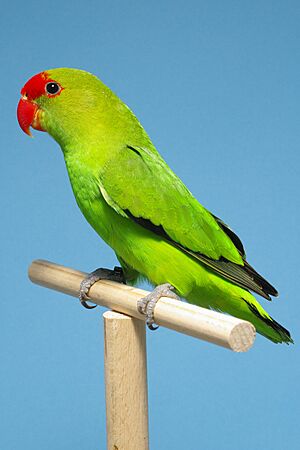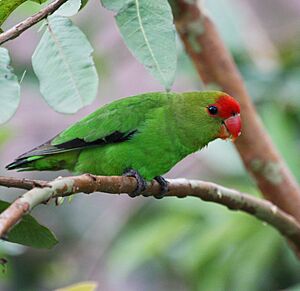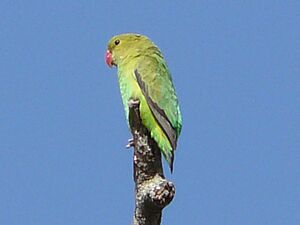Black-winged lovebird facts for kids
Quick facts for kids Black-winged lovebird |
|
|---|---|
 |
|
| Prize-winning Male of the German Bird Association. | |
| Conservation status | |
| Scientific classification |
The black-winged lovebird (Agapornis taranta) is also called the Abyssinian lovebird. It is a mostly green bird from the parrot family. This bird is about 16.5 cm (6.5 inches) long. This makes it the largest of the lovebird group. Lovebirds are small parrots.
Adult male black-winged lovebirds have a red forehead. Adult females have an all-green head. These birds live naturally in Eritrea and Ethiopia. They are not very common as pets.
Contents
About the Black-winged Lovebird

The black-winged lovebird is the biggest lovebird. It grows to about 16 to 16.5 cm (6.25 to 6.5 inches) long. These birds show something called sexual dimorphism. This means males and females look different. You can see these differences after the young birds molt. This happens when they are about eight or nine months old.
Both male and female black-winged lovebirds are mostly green. But only the adult male has a red forehead. He also has a ring of red feathers around his eyes.
The tail feathers have black tips. The feathers under the tail are yellowish. The feathers above the tail are light green. Males usually have black feathers under their wings. Females have greenish or brownish-black feathers there. Both male and female lovebirds have a red beak and gray feet.
Where They Live
The black-winged lovebird's natural home is in southern Eritrea and southwestern Ethiopia. They usually live in high plains or mountain areas.
Lovebird Behavior

What They Eat
Black-winged lovebirds eat many things. Their diet often includes sunflower seeds and corn. They also enjoy apples and mission figs.
How They Breed
Black-winged lovebirds build their nests inside tree holes. A female usually lays three or four white eggs. She sits on the eggs for 23 days to keep them warm. The baby birds leave the nest about 45 days after they hatch.
They usually breed from March to November. They make their nests in tree hollows. They might also use cracks in walls. Sometimes, they even use nests built by other birds. They fill their nests with plant bits and feathers.
Their Status in Nature
The black-winged lovebird is common in the places it lives. Because of this, it is listed as "Least Concern" on the IUCN Red List. This means it is not currently in danger of disappearing.
Lovebirds as Pets
Black-winged lovebirds are not very common as pets. It is hard to breed them in captivity. Even though they can handle cold weather, they are not widely kept.
Naming the Bird
The scientific name for this bird is Agapornis taranta. It was named by Stanley in 1814. Scientists keep special bird examples in museums. These examples help them study and name different species. One such example of this lovebird is kept at the World Museum in National Museums Liverpool.



